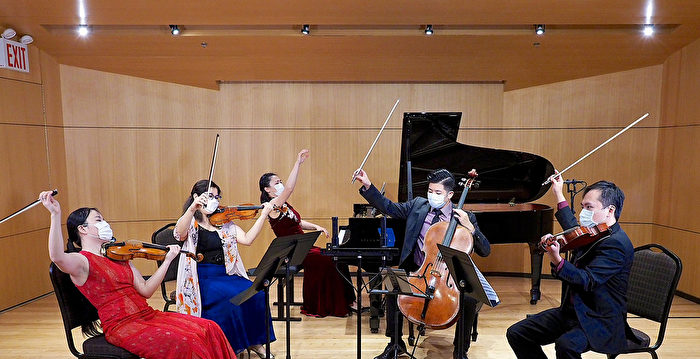[Epoch Times July 30, 2021](The Epoch Times reporter Lin Yijun reported in New York) In early 2020, the COVID-19 epidemic spread to the United States. New York Governor Andrew Cuomo issued a moratorium on March 22 last year, announcing New York completely closed non-essential industries, and New York City’s Broadway theaters, movie theaters, concert halls and other arts and entertainment spaces were the first to bear the brunt, cutting the life plans of many art workers.

For a time, many young Taiwanese art workers in the United States have “returned overseas.” The Broadway Theater in New York City staged the “Empty City Project”, and art exhibition centers across Taiwan became packed.
At the same time, there are still a group of young Taiwanese who choose to stay in New York, intending to apply for special talent visas after the end of the US general election, but they did not expect that the epidemic will bring them a more realistic and cruel test than thinking about income.
The safety brand girl challenges the creation of the good news, there are unspeakable bitterness behind
At the end of 2019, Ye Fangting had just completed two years of Martha Graham’s modern dance teaching certification course and advanced training. Because she was deeply attracted by New York’s tolerant artistic environment and fresh air, she planned to find a dance company to stay in New York. Try to apply for a special talent visa.
Unexpectedly, COVID-19 hit like a tsunami, not only disrupted her original plan, her visa application was severely affected, and the prospects for recovery in New York were unclear, which almost made her give up dancing.
“The epidemic really killed my enthusiasm for dancing.” Ye Fangting said.
Even though he is used to being sad and restless in his digestion, Ye Fangting still suffers from insomnia, hair loss, and weight loss due to the epidemic. “Whenever I feel stressed, I lose weight. After the epidemic broke out in March last year, I temporarily returned to Taiwan. At that time The family was so thin that they were shocked.”
Originally, she applied for a visa to join the dance troupe. In the face of the epidemic, the dance troupe stopped. In order to make up for the proof of ability required by the visa, Ye Fangting also gritted her teeth and challenged her to leave the National Taiwan Arts University Dance Department. creation.
Ye Fangting thinks she is not good at expressing herself, but the epidemic forced her to work with talents from different cultural backgrounds or fields to explore the possibility of survival outside the dance troupe.
Although she successfully participated in Russia’s “Open Vision Film Fest” with “Silent But Not Silenced” produced with other Taiwanese artists in New York, Ye Fangting expressed the sadness behind the scenery.
“We thought we could perform face-to-face with the audience this year.” Ye Fangting said.
The theater closed due to the epidemic has lost the stage for them to show their talents, and lack of venues for dance practice, and the skills they are familiar with will become unfamiliar.
“Once a very powerful dance teacher offered an online class, but I could only take the class in the room. There was no space to practice. It was really difficult to reach the standard.” Ye Fangting said, and pointed out that after the epidemic prevention restrictions were loosened, she was wearing a mask. Line dancing is also unimaginably painful.
“Some dances are very fast, maybe ten moves in eight beats, I danced with a mask…I really jumped to the eyes to catch gold stars, so I had to say that I was going to faint and I needed to take a rest outside.” Speaking of this suffocating experience, Ye Fangting’s tone couldn’t hide the haste.
Revisiting the various effects brought about by the epidemic, Ye Fangting believes that she has not fully survived the low ebb, but her life plan is not completely constrained; to her, the epidemic is more like “opening her own alternative to artistic expression, which can be regarded as another option. An interesting life experience.”
Ye Fangting said: “I never thought about engaging in dance creation. The epidemic made me think a lot about dance, life, and the relationship between people, which gave me a lot of eagerness to create ideas.”
New-born drama actors face life beyond their dreams after the epidemic
Li Changhan, who came from the French Department of National Central University, fell in love with theater performance and went to the Lee Strasberg Theatre and Film Institute in New York four years ago to study. Last year, he appeared on Amazon’s audio-visual platform “Eighty 12” (Eighty 12). In the play, he played a transfer student who needed to adapt to a new environment while bearing the expectations of his family and difficult to confess to his classmates.
The 30th generation of Li Changhan has sharp eyes, a thin body, and a full of literary hairstyle. The drama teacher in New York thinks that his temperament is similar to that of Johnny Depp, but he knows that he is not a martial arts professional such as Donnie Yen, and he is not English. People, it is not easy for Asian actors to become famous in the European and American entertainment circles.
Before the epidemic, Li Changhan was also working in the catering industry while fighting for performance opportunities. After the epidemic hit the catering industry and the performing arts circle, Li Changhan not only suffered a sharp decline in income, but also accidentally contracted the epidemic at the beginning of this year and stayed in New York’s anti-epidemic hotel alone to celebrate the New Year.
“When I knew that I was infected, I felt guilty and blamed for the first time.” Li Changhan said, “I felt that I didn’t take good care of my body, and I was worried that I might infect my roommates.” Although I made a call overseas to report the illness to my family. , But he dared not let his father know, “He is a person who is easy to worry about.”
Fortunately, Li Changhan is only a mildly ill patient, but the experience of this epidemic also made him think about the “existential crisis” that has not been faced up until now: what will I be after removing my role as an actor?
He asked himself: “I am a person who insists on doing one thing at a time, a bit stubborn; and I used to think that if you want to accomplish one thing, it is inevitable to sacrifice another.”
Li Changhan understands that this kind of personality that has deep self-discipline and is not easy to stop without reaching goals is a double-edged sword. In the face of a treacherous and changeable virus, an inelastic personality can easily hurt himself in turn.
In order to explore more possibilities for himself, Li Changhan, besides participating in online seminars with people in the entertainment industry, also tried to study financial management, read psychology books and spiritual growth books. In addition to routine fitness and boxing, he also started sooner or later. Minutes of meditation, try to talk to the deep self.
Li Changhan loves “The Great Master” directed by Wong Kar-wai. He cited the three stages that martial artists in the film need to go through: “Seeing oneself, seeing the world, and seeing all beings” to describe the current state of mind.
“In the showbiz, I am still a newcomer, and I am still trying to see myself at the stage.” He said.
Not long ago, Li Changhan successfully obtained the special talent visa, but his next step is to temporarily return to Taiwan to recharge and reconcile with his family. “Besides dreams, health and family are also very important.” He said.
With a trace of helplessness on Li Changhan’s face, he smiled and said, “Although I know this will delay the time I can stay in the United States, I really need a period of time to recharge.” Huiyu’s eyes still have a love for performing arts.
Known as the old man in New York, the old man is still there after the epidemic hit
Violaist Lin Weiyang has studied in New York since high school and graduated from the Juilliard School of Music. He has lived in the United States for more than 20 years. He likes to make friends and was the president of the Taiwan Youth Chamber of Commerce in New York (TJCCNY); he is optimistic and enthusiastic. He was given the title of being a Taiwanese student who came to live in the “Big Apple” and would definitely know the “elder in New York.”
In the face of the difficult epidemic situation, Lin Weiyang admitted that he felt depressed at the beginning because all the performances were cancelled, but he emphasized: “It is not a low ebb.”
Lin Weiyang said: “Maybe because my personality is more optimistic, I don’t think too much, and my family is around me, so I’m less likely to be hit as hard as other artists who come to live in New York alone, and my friends around will not. I have always cared about what’s wrong with me, but they all let me know that if I need help, my friends will be there.”
Lin Weiyang recalled that when the epidemic broke out last year, he lost all performance invitations. He did not expect that an old senior who had retired from the world would still generously support him to continue his music career. “I am still very moved when I think about it.”
During the epidemic, Lin Weiyang, in addition to maintaining the co-founded New Asia Chamber Music Association (NACMS), to perform live broadcasts on the Internet to create opportunities for musicians to expose. Under the leadership of friends, he also tried to start an e-commerce business, and he also created two in one go. Two platforms: Farm2Manhattan sells Taiwanese specialties, and Lingogo sells high-quality masks from MIT.
Speaking of the unemployment of many art workers in the epidemic, Lin Weiyang said frankly that not everyone has the resources to stay where they live. “Really needs to think about skills other than art majors.” He shared that a young professional cellist around him turned to work during the epidemic. Learning the code of the program, successfully changing to an engineer, and earning higher income, but it also means that the probability of the other party returning to the music scene is unlikely.
After experiencing the craziest period of the New York epidemic, and now that the e-commerce business has a new direction, will Lin Weiyang leave the music industry like the former cellist?
In fact, this is not the first time that this question was thrown to Lin Weiyang, but he always replied with the same answer: “I still want to take the road of music, I just like to perform on stage.”
Lin Weiyang has always insisted in the music industry. In addition to sincerely like to perform on stage, with 15 years of teaching experience, he is full of New York, and he plans to return to Taiwan to establish an international art school in a young year.
“I feel that Taiwan has always lacked an art school with an international perspective, so I want to go back and establish it and promote local development at the same time.” Lin Weiyang said, “Many great Taiwanese art workers returned to Taiwan due to the epidemic, and they just happened to be able to replace them. For the foreign musicians performing in Taiwan, Taiwanese have a better understanding and recognition of returned talents in the field of art. This is an opportunity.”
Editor in charge: Li Yue
.
